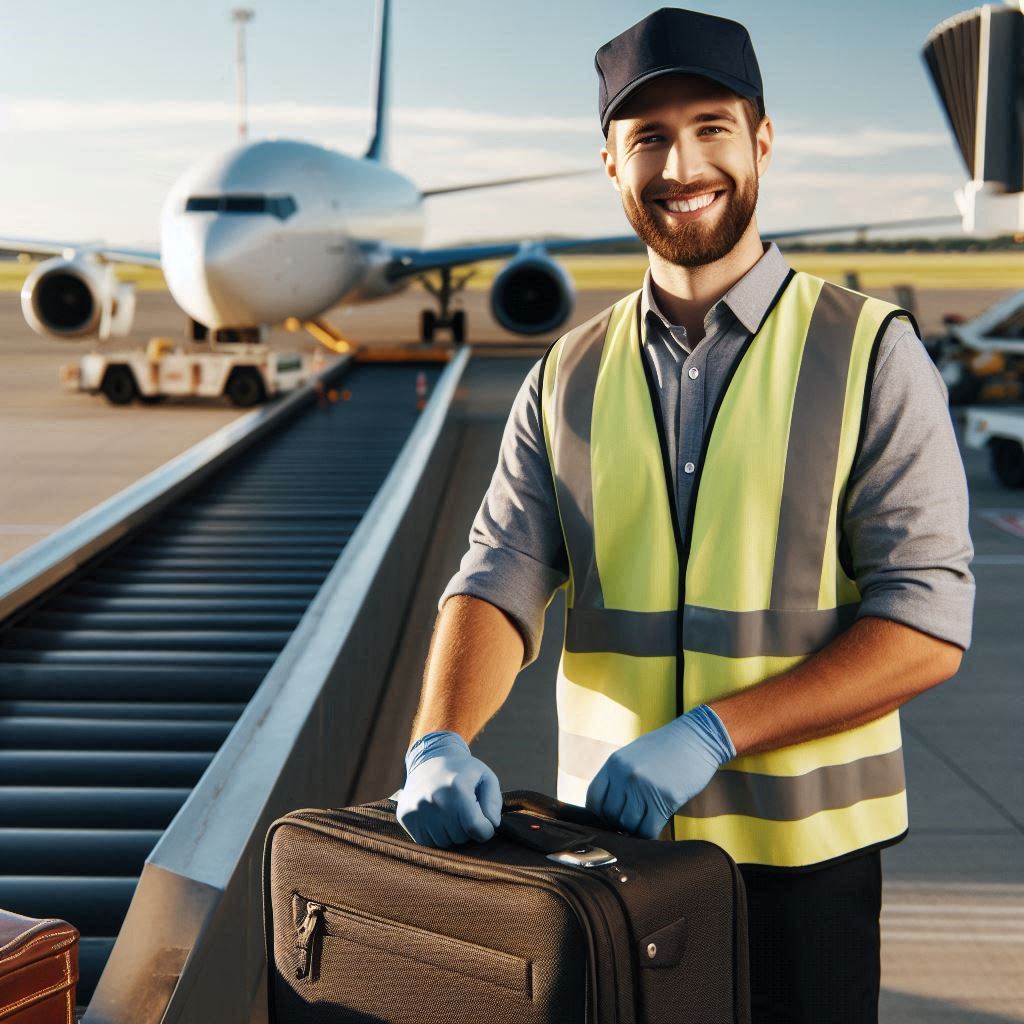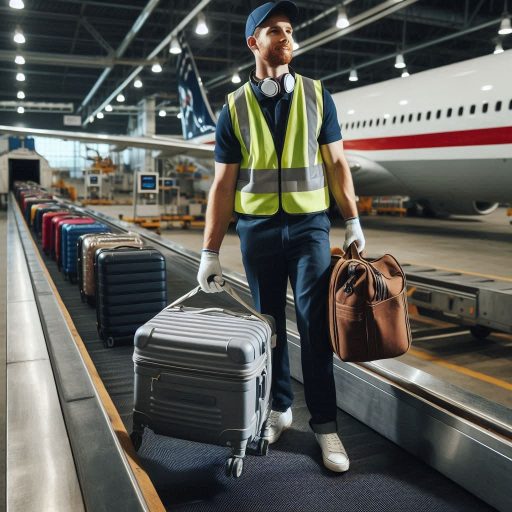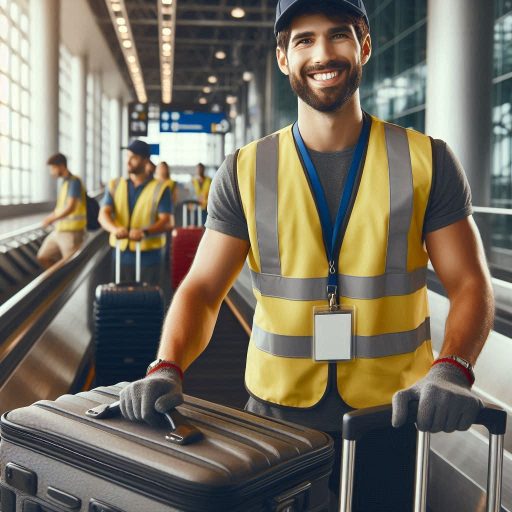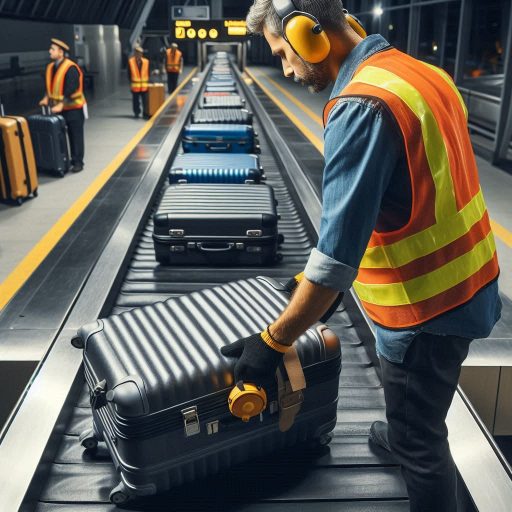Introduction
Baggage handlers play a crucial role in the travel industry.
They ensure passengers’ luggage is loaded, unloaded, and transported efficiently.
Their work keeps airport operations running smoothly and minimizes delays, which directly impacts passenger satisfaction.
Without baggage handlers, the flow of luggage would be disorganized, leading to misplaced items and travel disruptions.
The job of a baggage handler is physically demanding.
Handlers lift, carry, and move heavy luggage for extended periods.
They often work in challenging environments, including varying weather conditions on the tarmac.
The role requires physical strength, endurance, and attention to detail.
Ensuring proper handling of baggage helps prevent damage and ensures that all luggage reaches the correct destination.
Additionally, baggage handlers work under tight time constraints to meet flight schedules.
This fast-paced environment demands efficiency and quick decision-making.
Handlers must also follow strict safety protocols to avoid accidents and ensure smooth operations.
Despite the physical challenges, the job offers stability and the opportunity to work in a dynamic environment.
Baggage handlers are essential in maintaining an organized and timely airport experience.
Baggage handlers are vital to the travel industry, and their physically demanding work ensures passengers’ luggage is handled with care and efficiency.
Job Responsibilities
Loading and Unloading Luggage Onto Airplanes
A key responsibility of a baggage handler is loading and unloading luggage onto airplanes.
Handlers work quickly to transfer suitcases from the airport to the aircraft.
They ensure each piece of luggage is handled with care to avoid damage.
This task requires physical stamina and precision to ensure bags are properly secured.
Baggage handlers often use specialized equipment like conveyor belts and luggage carts to transport heavy or large items.
They must follow strict safety protocols to prevent accidents during loading.
Efficiently handling luggage helps maintain flight schedules and ensures passengers’ belongings arrive at their destination on time.
Ensuring Luggage is Correctly Transferred to Connecting Flights
Baggage handlers also ensure luggage is correctly transferred to connecting flights.
They are responsible for making sure each bag is directed to its final destination.
Properly tagging and sorting luggage is crucial to avoid mix-ups or lost bags.
Handlers work closely with other airport staff to coordinate this process.
This responsibility becomes particularly important when passengers have tight layovers.
Quick and accurate luggage transfers help passengers catch connecting flights without delays.
Handlers must stay organized and efficient to keep up with the fast-paced demands of airport operations.
Handling Oversized or Irregularly Shaped Baggage
Baggage handlers are trained to handle oversized or irregularly shaped luggage.
This includes items such as sports equipment, musical instruments, or large suitcases.
These items require extra care during transport to avoid damage.
Handlers must know how to load and unload these items safely and securely.
Proper handling of oversized baggage is essential to prevent accidents and delays.
Handlers use specialized equipment to move larger items and ensure they are properly stowed on the aircraft.
Careful handling protects both the luggage and the aircraft’s interior from potential damage.
Reporting Any Damages or Issues With Luggage
Baggage handlers are responsible for reporting any damages or issues with luggage.
If a piece of luggage is damaged during handling, the handler must document it immediately.
They must follow the airline’s reporting protocols to ensure the passenger is informed.
Timely reporting helps resolve problems quickly and maintains customer satisfaction.
Additionally, baggage handlers report any issues that could impact flight safety.
For example, if luggage is too heavy or improperly packed, it could pose a risk during the flight.
Handlers play an important role in identifying and addressing such issues before the flight departs.
Baggage handlers are essential to smooth airline operations.
They load and unload luggage efficiently, ensuring safe transfers to connecting flights.
Their ability to handle oversized or irregular baggage adds to their importance.
Reporting damages and addressing issues promptly is crucial for maintaining customer satisfaction.
Baggage handlers’ attention to detail, safety, and efficiency make them key contributors to a successful travel experience.
Read: How to Create a Pet-Friendly Grooming Environment
Skills and Qualifications
Ability to Lift Heavy Objects and Work in a Fast-Paced Environment
Baggage handlers need the physical strength to lift heavy objects regularly.
Luggage often exceeds 50 pounds, requiring consistent lifting and carrying.
Handlers must perform these tasks quickly to keep airport operations running smoothly.
The work environment is fast-paced, particularly during busy travel seasons.
Baggage handlers must load and unload luggage efficiently.
This high-pressure environment demands physical endurance and the ability to stay focused under time constraints.
Additionally, baggage handlers are responsible for transporting bags between planes and terminals.
This job requires stamina, as it involves constant movement throughout the shift.
Handlers must manage these tasks while maintaining a high level of accuracy.
Strong Communication Skills to Coordinate with Other Team Members
Strong communication skills are crucial for baggage handlers.
They often work in teams, requiring clear and efficient communication to ensure operations run smoothly.
Effective coordination helps prevent delays and mistakes in handling luggage.
Handlers must communicate with other departments, such as flight crews and ground staff.
This collaboration ensures that luggage is loaded and unloaded on time.
Miscommunication can lead to misplaced or delayed luggage, so clear dialogue is essential.
Additionally, baggage handlers may need to report issues or concerns to supervisors.
Whether it’s equipment malfunction or damaged luggage, clear communication ensures problems are addressed promptly.
Handlers must convey information accurately and quickly to prevent larger issues.
Attention to Detail to Ensure Accurate Handling of Luggage
Attention to detail is a key skill for baggage handlers.
Handlers are responsible for ensuring luggage is sorted and delivered to the correct destinations.
A single mistake can result in lost luggage, causing inconvenience to passengers.
Each bag must be tagged and processed correctly.
Handlers must double-check tags, ensuring each piece of luggage is sent to the right flight.
Misplacing luggage can disrupt flights and cause delays, making accuracy essential.
Additionally, baggage handlers may need to handle special requests, such as fragile or oversized luggage.
These require extra care and attention to detail.
Ensuring proper handling protects passengers’ belongings and maintains the airline’s reputation for reliable service.
Ability to Work in Various Weather Conditions
Baggage handlers work outdoors in various weather conditions.
Rain, snow, and extreme heat are common challenges.
Handlers must adapt to changing weather without compromising their performance or safety.
Weather conditions can slow down operations, but baggage handlers must continue working efficiently.
They need to manage luggage in all types of weather while maintaining safety standards.
Employers often provide proper gear, but the ability to work in harsh weather is essential.
In colder climates, handlers might face icy conditions, requiring extra caution.
In hot climates, working under the sun demands hydration and protective clothing.
Regardless of the weather, handlers must continue loading and unloading luggage to keep flights on schedule.
Being a baggage handler requires a unique blend of physical strength, attention to detail, and adaptability.
The ability to lift heavy objects and manage time efficiently is crucial in the fast-paced airport environment.
Strong communication skills ensure smooth coordination between teams, and attention to detail prevents errors in luggage handling.
Adapting to various weather conditions further emphasizes the resilience and flexibility required in this role.
Overall, baggage handlers play a vital part in ensuring smooth travel experiences for passengers.
Read: The Role of Technology in Modern Pet Grooming
Training and Education
On-the-Job Training Provided by Airlines
Baggage handler positions typically come with on-the-job training, which airlines provide to new employees.
This training ensures that handlers understand the specific processes and systems used by the airline.
New hires learn how to safely handle luggage, operate machinery, and manage time efficiently.
Training programs often include guidance on how to lift and transport heavy items without injury.
Trainees also familiarize themselves with equipment like conveyor belts and baggage carts.
This hands-on experience prepares them for the physical demands of the role.
Airlines also teach employees how to work within strict timelines, emphasizing punctuality and efficiency in daily tasks.
In addition, on-the-job training introduces new baggage handlers to the airport’s specific layout and procedures.
It helps them understand how different teams work together to ensure a smooth operation.
Airlines aim to create well-rounded employees who can perform multiple tasks in various settings.
High School Diploma or Equivalent Usually Required
To become a baggage handler, most airlines require candidates to have a high school diploma or equivalent.
This basic educational qualification ensures that potential employees have the foundational skills needed for the job.
These skills include communication, reading comprehension, and basic problem-solving abilities.
A high school education also provides candidates with the ability to follow instructions and adhere to safety guidelines.
While higher education is not typically required, having a diploma ensures that baggage handlers can effectively carry out their daily duties.
Some airlines may consider applicants without a diploma, but having one improves a candidate’s chances of being hired.
Airlines may also look for candidates who demonstrate a strong work ethic and reliability.
Since baggage handling is a physically demanding job, employers value candidates who show commitment and a willingness to learn.
Additional Certification in Baggage Handling May Be Beneficial
Although not always required, additional certification in baggage handling can benefit candidates seeking to advance in this career.
Certification programs teach specialized skills, such as handling hazardous materials, operating advanced equipment, or adhering to specific safety regulations.
These certifications can make candidates stand out during the hiring process, showcasing their commitment to professional development.
Some certifications also offer training on handling oversized or fragile luggage, which can be valuable in certain baggage handling roles.
Pursuing these certifications demonstrates initiative and a desire to excel in the field.
Employers often view certification as a sign of dedication and professionalism.
This can lead to quicker promotions or additional responsibilities within the airline.
Additionally, certification may help baggage handlers transition to other related positions in logistics or airport operations.
Ongoing Training to Stay Updated on Safety Procedures
Baggage handlers undergo ongoing training to stay updated on safety procedures and industry regulations.
Safety is a top priority in this role, so employees must regularly refresh their knowledge.
Airlines provide refresher courses on proper lifting techniques, equipment operation, and emergency protocols.
These training sessions also cover updates to federal and local safety regulations that impact airport operations.
Staying current with these standards helps prevent accidents and ensures a safe working environment.
Additionally, ongoing training allows employees to stay informed about new technologies or tools introduced in the baggage handling process.
In review, airlines provide essential training for baggage handlers, starting with on-the-job instruction and continuing with ongoing safety updates.
While a high school diploma is usually required, additional certification can boost career prospects.
Staying updated on safety procedures through continuous training ensures that baggage handlers maintain the highest safety standards throughout their careers.
Read: The Role of Technology in Modern Pet Grooming

Work Environment
Airport Terminals, Tarmacs, and Baggage Claim Areas
Baggage handlers work in various areas of the airport, including terminals, tarmacs, and baggage claim zones.
In terminals, handlers load and unload baggage onto conveyor belts and assist with organizing luggage.
They also ensure that bags reach the correct locations for departing or arriving flights.
On the tarmac, baggage handlers load luggage into the cargo holds of aircraft.
This work requires precision and attention to detail, as handlers must balance weight for safe flight operations.
Working in baggage claim areas involves sorting incoming luggage and delivering it to designated belts for passengers to collect.
The role demands physical endurance and adaptability to different environments.
Handlers must remain alert and efficient to keep airport operations running smoothly.
These tasks are crucial for maintaining a seamless experience for passengers and supporting airline schedules.
Exposure to Varying Temperatures and Noise Levels
Baggage handlers regularly experience extreme temperature changes due to their work environment.
On the tarmac, they may face freezing cold or intense heat, depending on the season.
Proper clothing and gear help handlers stay comfortable and safe in these conditions.
The role also involves exposure to high noise levels from aircraft engines, ground vehicles, and equipment.
Handlers must wear protective gear, such as earplugs, to reduce the risk of hearing damage.
Being aware of one’s surroundings is crucial for safety, as the work area is often loud and busy.
Adaptability to these conditions is important for anyone pursuing a career as a baggage handler.
Handlers need to be prepared for unpredictable weather and continuous noise.
Understanding how to manage these challenges ensures that they can perform their duties efficiently.
Shift Work Including Early Mornings, Evenings, Weekends, and Holidays
Baggage handlers must be flexible with their schedules due to the nature of airport operations.
Airports operate 24/7, requiring handlers to work at all hours, including early mornings, late evenings, weekends, and holidays.
This shift work is essential for ensuring flights are on time and passengers’ luggage is properly handled.
Working irregular hours can affect a handler’s personal life and sleep patterns.
Candidates must be prepared to manage these demands and adjust to varying shifts.
Some may find working early morning shifts challenging, while others might prefer evening or overnight hours.
During holidays and peak travel seasons, baggage handlers face increased workloads.
Passengers travel in larger numbers, requiring more coordination and quicker turnaround times.
Being adaptable to the demands of shift work is key to succeeding in this role.
In closing, being a baggage handler requires working across diverse environments, including terminals, tarmacs, and baggage claim areas.
Handlers face exposure to extreme temperatures and loud noises, requiring adaptability and protective gear.
Additionally, shift work is an integral part of the job, often requiring work during early mornings, evenings, weekends, and holidays.
By understanding these aspects, candidates can better prepare for the demands of a baggage handler role.
Read: Nail Technician Etiquette: Dos and Don’ts
Transform Your Career Today
Unlock a personalized career strategy that drives real results. Get tailored advice and a roadmap designed just for you.
Start NowJob Outlook and Advancement Opportunities
Growing Demand for Baggage Handlers Due to Increasing Air Travel
The growing demand for baggage handlers is directly linked to the rise in global air travel.
With more people flying each year, airports are busier, and the need for efficient baggage handling has never been greater.
Airlines rely heavily on baggage handlers to ensure luggage is safely loaded and unloaded from aircraft.
As travel increases, airlines must meet the growing demand for quick and accurate baggage services.
This trend creates a steady stream of job opportunities for baggage handlers.
Many airports are expanding their workforce to keep up with the surge in air passengers.
Baggage handlers play a crucial role in ensuring smooth travel experiences for customers.
Additionally, advancements in airport infrastructure have increased the volume of flights and passengers.
With more flights comes more luggage, requiring skilled baggage handlers to manage the load.
The job is physically demanding but essential for keeping airport operations running smoothly.
Airlines and ground services companies are constantly recruiting new baggage handlers to meet these demands.
As air travel continues to grow, job stability for baggage handlers remains strong.
Those seeking steady employment with opportunities for growth can find security in this career.
Potential for Advancement to Supervisory Roles or Other Positions
While the role of a baggage handler is primarily entry-level, there is significant potential for career advancement.
Many baggage handlers move into supervisory positions as they gain experience.
Supervisors oversee teams of baggage handlers, ensuring that daily tasks are completed efficiently and safely.
Supervisory roles involve coordinating schedules, managing workloads, and addressing any operational issues that arise.
This position allows baggage handlers to take on more responsibility and leadership duties.
Those with strong communication and organizational skills often excel in these roles.
Advancement within the airline industry doesn’t stop at supervision.
Baggage handlers can explore other career paths in airline operations, logistics, or customer service.
Their experience working behind the scenes gives them a unique understanding of airport functions.
This insight is valuable in roles like ground operations management or airline logistics coordination.
Additionally, baggage handlers may transition into other technical roles, such as aircraft maintenance or ground support.
These positions often require additional training, but baggage handlers with experience have an advantage.
Their familiarity with airport procedures and equipment makes the learning process smoother.
Airports and airlines offer training programs to help employees advance in their careers.
By taking advantage of these opportunities, baggage handlers can gain new skills and open doors to higher-paying positions.
Pursuing certifications or further education in aviation or logistics can also accelerate career growth.
In general, the demand for baggage handlers continues to grow as air travel expands.
This steady demand offers job security and opens the door for career advancement.
Baggage handlers can move into supervisory roles or explore other paths within the airline industry.
With dedication and training, the potential for growth in this career is substantial, making it a promising choice for those interested in the aviation field.
Salary and Benefits
Average Salary Range for Baggage Handlers
The average salary range for baggage handlers varies based on location and experience.
Typically, baggage handlers earn between $25,000 and $40,000 annually.
Entry-level positions usually start at the lower end of this range, with opportunities to increase over time.
Experience and tenure can lead to raises, with senior baggage handlers earning closer to the upper range.
In some locations, higher wages are offered due to the cost of living or airport size.
Major hubs or high-traffic airports may offer more competitive salaries.
Additionally, baggage handlers working at international airports might see higher wages compared to those at regional airports.
Unionized baggage handlers can also benefit from collective bargaining agreements that offer structured pay increases.
Benefits Such as Health Insurance, Retirement Plans, and Travel Perks
Most baggage handler positions come with a comprehensive benefits package.
Health insurance is often included, covering medical, dental, and vision care.
These benefits provide financial security, ensuring that employees have access to necessary healthcare without excessive out-of-pocket expenses.
Some employers may offer various plans to choose from, catering to individual or family needs.
In addition to health insurance, many baggage handlers are offered retirement plans such as 401(k) options.
Employers often match employee contributions up to a certain percentage, helping workers build their retirement savings.
This long-term benefit is a significant advantage, providing financial security after years of service.
A unique perk of working as a baggage handler is the travel benefits.
Many airlines offer employees discounted or even free flights.
These travel perks often extend to immediate family members as well, allowing employees and their families to travel at reduced costs.
This incentive is highly valued by workers who enjoy traveling and exploring new destinations.
Additional Incentives for Working Overtime or Holidays
Baggage handlers often have opportunities to earn additional income by working overtime or during holidays.
Many airports are busiest during weekends, holidays, and peak travel seasons.
To accommodate increased passenger volume, baggage handlers may be required to work extra hours.
Working beyond standard shifts usually comes with financial incentives such as overtime pay.
Overtime compensation is generally paid at a higher hourly rate, often 1.
5 times the regular wage.
This presents an excellent opportunity for employees looking to boost their earnings.
Overtime work is especially common during holiday periods when travel demand surges, and airlines need more staff to handle the increased baggage load.
In addition to overtime, holiday pay can provide an extra financial incentive.
Many companies offer double pay or additional bonuses for working on holidays like Christmas or Thanksgiving.
These incentives help compensate employees for working during traditionally off-time and can significantly boost their yearly income.
To sum it up, a baggage handler’s salary and benefits package offer a balanced compensation structure.
Competitive wages, health insurance, retirement plans, and travel perks make the role attractive.
Additional income opportunities from overtime and holiday shifts further enhance earning potential.
These comprehensive benefits make baggage handling a rewarding career option for those entering the service industry.
Conclusion
Baggage handlers play a key role in ensuring smooth airport operations.
Their primary responsibilities include loading, unloading, and transporting luggage.
They also operate conveyor belts, carts, and other equipment to move bags efficiently.
Attention to detail is essential, as handlers must ensure luggage is handled safely and delivered to the correct locations.
Key skills required for baggage handlers include physical strength, teamwork, and time management.
Handlers work in fast-paced environments, often under tight deadlines.
They must also comply with health and safety regulations to minimize workplace injuries.
Effective communication and problem-solving skills help handlers adapt to unexpected challenges, such as damaged luggage or scheduling delays.
For those considering a career in baggage handling, it offers a hands-on, dynamic work environment.
The role provides opportunities to develop transferable skills, such as teamwork and time management.
With experience, baggage handlers can advance to supervisory or managerial positions in aviation or logistics.
Baggage handlers are crucial to ensuring smooth and efficient travel experiences for passengers.
Without their dedication, luggage could be misplaced or delayed, causing frustration.
Their work behind the scenes ensures that passengers receive their belongings promptly and safely.
[E-Books for Sale]
The Big Book of 500 High-Paying Jobs in America: Unlock Your Earning Potential
$19.99 • 500 High-Paying Jobs • 330 pages
Explore 500 high-paying jobs in America and learn how to boost your career, earn more, and achieve success!
See All 500 High-Paying Jobs of this E-Book
1001 Professions Without a Degree: High-Paying American Jobs You Can Start Now
$19.99 • 1001 Professions Without a Degree • 174 pages
Discover 1001 high-paying jobs without a degree! Unlock career tips, skills, and success strategies for just $19.99!




